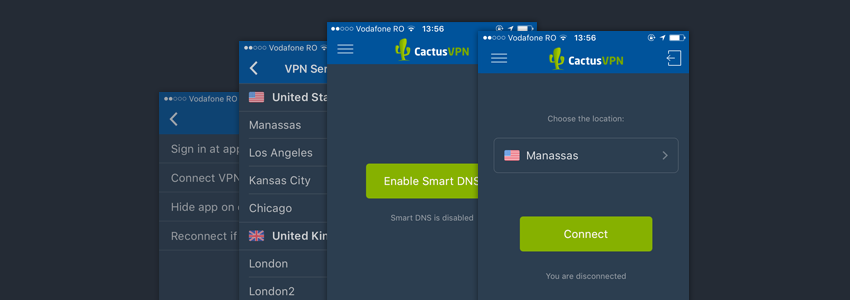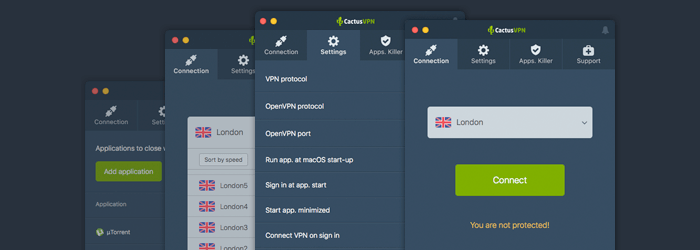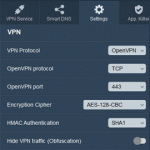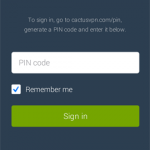Do I Need a VPN on My iPhone? (7 Reasons You Do)

iPhones are pretty versatile and secure, and they’re convenient to use whenever you want to browse the web – at home, at work, or on the go.
But you’re probably asking yourself: “Do I need a VPN on my iPhone to enjoy an even better online experience?”
The quick answer is a resounding “Yes.” If you want to know why, read on.
Is VPN Necessary for iPhone, Actually?
Doesn’t Apple provide top-notch encryption?
That’s true – Apple uses end-to-end encryption to protect your data when you use iOS devices.
However, that doesn’t mean they’ve got your best interests in mind, or that there aren’t any loopholes they can use to share your info with other people.
After all, just consider the following:
- Apple is part of the PRISM surveillance program. They joined back in 2012, and being part of the NSA’s surveillance program means sharing documents, connection logs, audio files, videos, images, emails, and live chat data with the NSA.
- The company actually shares some data with third-party devs. That might not seem so bad, but do keep in mind that means thousands of devs will get access to things like your facial data, for instance.
- Even though Apple makes it clear iOS devs need to enable end-to-end encryption on the apps they build, around 68% of them don’t do that.
“Do I need a VPN on my iPhone?” suddenly becomes quite a redundant questions once you know all that, right?
Still, we’re going to offer you eight good reasons why you should use a VPN on your iPhone.
7 Reasons You Need to Start Using a VPN for iPhone Devices Today
1. A VPN Helps You Stay Safe on Public WiFi
If you use unsecured public WiFi networks on your iPhone, you expose your traffic and data to all sorts of risks – malware, eavesdropping, and even WiFi spoofing.
Also, cybercriminals could use the lack of encryption to try and monitor your online communications. If they’re successful, they can steal info like your credit card details and login credentials.
What’s more, you’re not 100% safe even if you use WPA2-secured networks. WPA2 actually has multiple security flaws, one of which actually allows cybercriminals to crack network passwords.
And it’s gonna be a while until WPA3 gets deployed and fixes all of WPA2’s problems.
But if you use a VPN for iOS devices, you won’t need to worry about that since the service encrypts your Internet traffic. If a cybercriminal would try to monitor it, they’d just see gibberish and nothing more.
2. It Helps You Bypass Geo-Restrictions
Let’s say you just got a new iPhone model, and can’t wait to watch some top-notch TV series on it. You grab a beer and some snacks after work, make yourself comy in your LA-Z-Boy, and try to load some episodes from the latest hit series on Netflix or Hulu you heard of.
But your smile and comfort quickly disappear when you get a message telling you the content isn’t available in your area, or you just get redirected to a different website.
That’s geo-blocking in action. Frustrating content restrictions that get in the way of your entertainment simply because you’re from the “wrong” part of the world.
Luckily, if you use a VPN for iPhone devices, you can easily bypass any geo-restrictions you come across. The service hides your IP address (and, thus, your geo-location), so content platforms will no longer know where you are connecting from.
3. With a VPN for iPhone, Censorship Is No Longer a Concern
Not worried about geo-blocks?
Lucky you, but you’re still not out of the woods yet.
You can’t expect to have direct access on your iPhone to any content you want if you travel to a country whose government blocks various websites – like China, Iran, Russia, South Korea, or Egypt (just to name a few examples).
That means you might not be able to use Facebook, YouTube, or Skype, for instance. Not to mention you also might have limited or no access to the app store.
What’s more, what happens if your own government suddenly starts deciding they want to block certain websites or iPhone apps?
Sure, that’s mostly speculation, but you never know. For example, when you think of censoring online content, the UK doesn’t exactly come to mind first. Yet popular websites (like Jezebel, TorrentFreak, and Bish) still got “accidentally” blocked.
So, having a VPN for iPhone devices at the ready is definitely a good idea. With it, you can bypass any censorship you come across since the service hides your real IP address.
4. You Won’t Have to Deal with Workplace/School Firewalls Anymore
Whether you go to high school, live on a college campus, or spend most of the day in an office, you’ve probably noticed you weren’t able to access certain websites when browsing the web on your iPhone.
That’s because the network admin blocks them to comply with school and workplace regulations.
Well, if you use a VPN for iOS, you won’t need to worry about such restrictions. Since the service will hide your IP address, you’ll bypass any firewall you come across.
5. Your ISP Will No Longer Be Able to Spy on You
Without a VPN, your ISP can pretty much see every single thing you do on the web – what websites you visit, your unencrypted communications, how much time you spend on the web or a certain web page, and – most importantly of all – your browsing history.
Leaving the creepiness factor aside, your ISP can easily sell all that info to the highest bidder – namely third-party advertisers.
The good news is that you can prevent any of that from happening if you use a VPN service. Since it encrypts your traffic, your ISP can’t see any of your browsing habits. So, they won’t have any info to sell to advertisers.
6. A VPN Protects You from Bandwidth Throttling
Bandwidth throttling is when your ISP intentionally slows down your online speeds because you’re using up “too much data” doing stuff like downloading files, watching videos, or playing online games.
They can easily do that because they can see what you do when you browse the web on your iPhone.
If you use a VPN, though, you won’t need to worry about that. The service will encrypt your traffic, making sure your ISP will only see that you’re using a VPN server, and nothing more.
7. With a VPN for iOS, Gaming Becomes More Enjoyable
Many people like to use their iPhone to play video games. If you’re one of them, a VPN would come in handy if you especially enjoy online games.
Why?
Well, since a VPN hides your IP address, it can help you:
- Bypass geo-blocks that prevent you from playing in the same region as your friends.
- Prevent DoS/DDoS attacks from ruining your gaming experience.
- Evade annoying IP bans issued by admins who are sore losers.
And, like we already mentioned, a VPN hides your traffic too, ensuring your ISP can’t throttle your bandwidth, which – in turn – will negatively impact your gaming experience.
Also, since you can connect to a VPN server that’s close to the gaming server you’re using, you might be able to reduce ping times and lag.
If you’d like to learn more about VPNs and video games, follow this link.
Secure Your iPhone Experience With CactusVPN
If you want to enjoy a safe, private Internet browsing experience, we’ve got you covered. Our VPN service offers military-grade encryption, secure VPN protocols (IKEv2, L2TP/IPSec, OpenVPN), DNS leak protection, and the possibility to configure up to five simultaneous connections on different devices (perfect if you have multiple iPhones in your house).
What’s more, we offer a user-friendly iOS app, and we don’t log any of your data.

Special Deal! Get CactusVPN for $3.5/mo!
And once you do become a CactusVPN customer, we’ll still have your back with a 30-day money-back guarantee.
Do I Need a VPN on My iPhone? The Bottom Line
Well, Apple does offer a decent level of security, but it’s not without its flaws. The company is part of the PRISM surveillance program, after all, and it’s a well-known fact that not all iOS devs use end-to-end encryption within their apps.
So then, is VPN necessary for iPhone devices?
Definitely.
With a VPN, you can properly encrypt your online traffic, and hide your IP address too. That way, you won’t need to worry about:
- Hackers exploiting unsecured networks to monitor your online communications.
- Your ISP selling your data to advertisers or throttling your bandwidth.
- Subpar online gaming experiences.
- Work and school firewalls, government censorship, and geo-restrictions preventing you from accessing your favorite online content.



